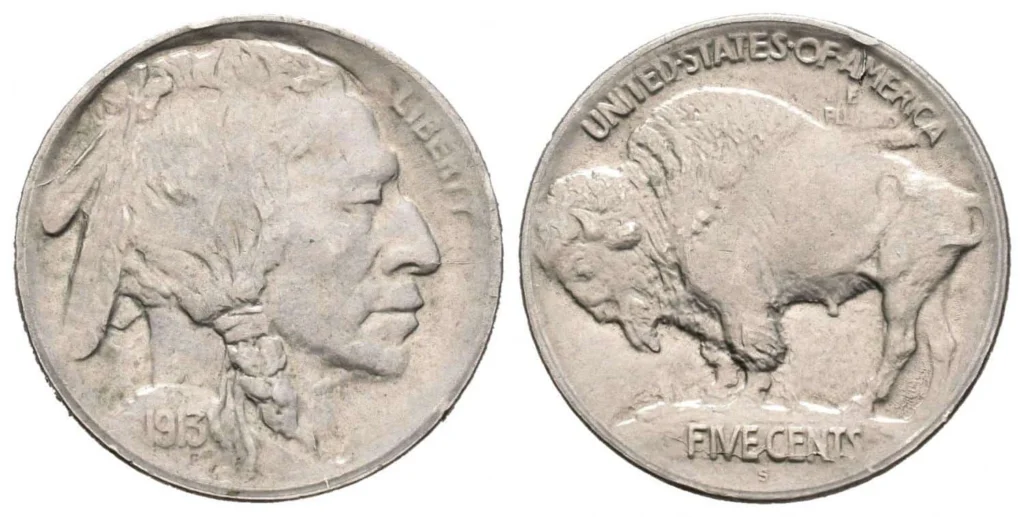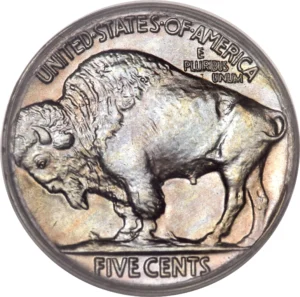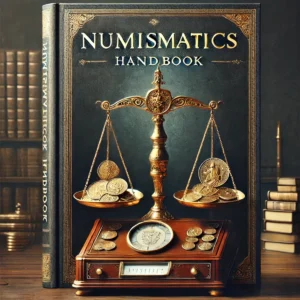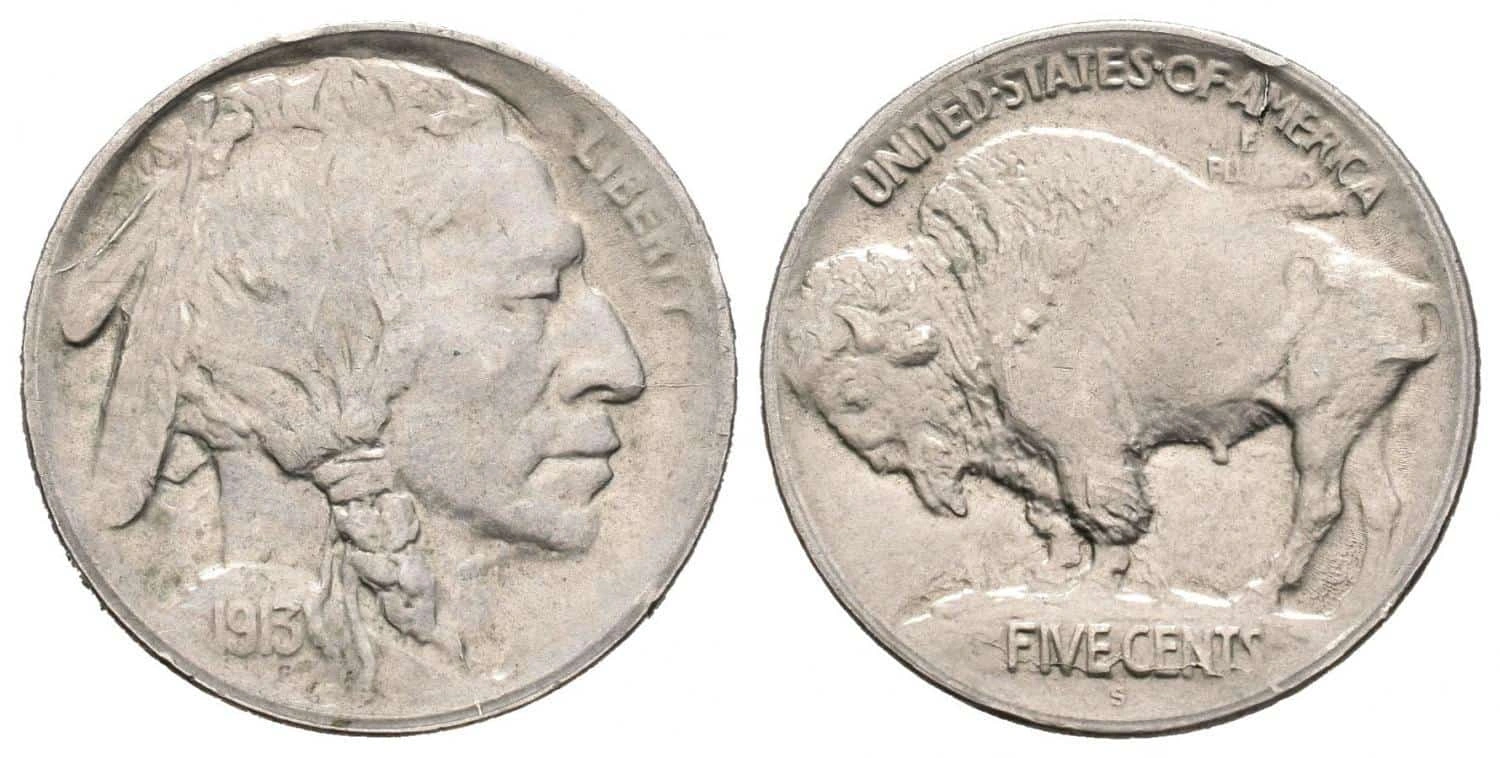Buffalo Nickels: Key Dates, Errors & Value (1913–1938)
Explore the historical value, unique designs, and collector fascination with Buffalo Nickels — a bold symbol of early 20th-century American coinage.

📘 Download the full guide: Numismatics Handbook — A +135-page expert resource on U.S. coin collecting.
Why Buffalo Nickels Matter
Buffalo nickels, minted from 1913 to 1938, are among the most visually iconic coins ever struck by the U.S. Mint. Designed by sculptor James Earle Fraser, these coins reflect the rugged, independent spirit of the American West.
They feature a composite portrait of Native American leaders on the obverse and a bison — inspired by Black Diamond, a buffalo from the Central Park Zoo — on the reverse. The coin’s artistry and national symbolism make it a favorite among U.S. coin collectors.

Collectors love Buffalo nickels for:
- Low-mintage rarities and short production run
- Famous and valuable error coins
- Distinctly American frontier-inspired design
- Historical relevance during World War I and the Great Depression
Whether pulled from old coin jars, estate sales, or inherited collections, Buffalo nickels capture the imagination of both entry-level and advanced collectors alike. They offer a wide range of values — from common circulated examples worth a couple bucks to rare errors and key dates worth thousands.
The series is also famous for its design challenges. The raised date on the obverse was one of the highest points on the coin, and as a result, it wore down quickly — leading to many dateless Buffalo nickels in circulation. Coins with full dates and strong strikes are highly sought after.
The transition from Type 1 (raised mound beneath the buffalo) to Type 2 (flat plain redesign in mid-1913) was made to improve longevity in circulation, adding another layer of collectibility. These variations, along with known doubled dies, overdates, and strike-related oddities, make Buffalo nickels an adventurous and rewarding niche.
Buffalo nickels represent the perfect mix of Americana, numismatic challenge, and investment potential — making them one of the most collected U.S. coins of the 20th century.
Buffalo Nickel Values & Key Dates by Year
| Year | Mint Mark | Est. Value (Avg) | Rare Variant? |
|---|---|---|---|
| 1913 | S (Type 2) | $300–$700 | Yes |
| 1918 | D | $200–$450 | Semi-Key |
| 1921 | S | $150–$400 | Yes |
| 1924 | S | $100–$300 | Yes |
| 1926 | S | $500–$1,200 | Rare |
| 1935 | Doubled Die | $400–$900 | Rare Error |
| 1937 | D | $800–$2,000+ | Famous “3-Legged” error |

Most Valuable Buffalo Nickels (Detailed Breakdown)
1. 1937-D “3-Legged” Buffalo Nickel ($800–$2,000+)
This legendary mint error resulted from over-polishing the die, erasing the front leg of the buffalo. Highly collectible and one of the most famous U.S. coin errors.
2. 1913-S Type 2 Buffalo Nickel ($300–$700)
Type 2 nickels had a recessed ground line to prevent excessive wear. The San Francisco issue is much scarcer than its counterparts.
3. 1926-S Buffalo Nickel ($500–$1,200)
Low mintage and poor strike quality make high-grade 1926-S nickels extremely desirable.
4. 1935 Doubled Die Obverse ($400–$900)
A rare doubling of the date and legends on the obverse makes this a must-have for error collectors.
5. 1918-D Overdate 1917 ($800–$1,500)
A scarce overdate where remnants of “1917” are visible under the “1918.” Highly sought-after by advanced collectors.
Comparison: Buffalo Nickels vs Jefferson Nickels
| Feature | Buffalo Nickels (1913–1938) | Jefferson Nickels (1938–Present) |
| Obverse Design | Native American head | Thomas Jefferson |
| Reverse Design | American Bison | Monticello |
| Metal Composition | 75% copper, 25% nickel | Same (except 1942–1945 silver alloy) |
| Key Rare Dates | 1937-D 3-Legged, 1926-S, 1913-S T2 | 1939-D, 1950-D |
| Error Rarity | Many famous errors | Fewer major collectible errors |
| Typical Value | $2–$2,000+ | $0.05–$20 (exceptions exist) |
| Collector Appeal | High visual & historical interest | Modern, often overlooked |

Common Buffalo Nickel Errors and Varieties
3-Legged Buffalo (1937-D)
Caused by die over-polishing; the front leg of the buffalo is missing. A legendary U.S. coin error.
Doubled Die Obverse (1935, 1936)
Look for strong doubling on the date and lettering.
Overdates (1918/7-D)
Partial remnants of a 1917 date appear beneath 1918.
Weak Strikes & Planchet Flaws
Buffalo nickels often show incomplete details or weakly struck legends, particularly on coins from San Francisco.
Comparison: Common vs Rare Buffalo Nickels
| Year | Mint Mark | Typical Value | Rarity | Notes |
| 1936 | — | $1–$5 | Common | Readily available |
| 1935 | — | $2–$6 | Common | Most found in circulated condition |
| 1926-S | S | $500–$1,200 | Rare | Low mintage and poor strike quality |
| 1937-D | D | $800–$2,000+ | Ultra Rare | Famous 3-legged error variety |
| 1913-S T2 | S | $300–$700 | Rare | Short-lived reverse redesign |
| 1935-DDO | — | $400–$900 | Rare Error | Obvious doubling on obverse date |
How to Sell Buffalo Nickels
Step 1: Sort by Year and Mint
Identify coins from key years and San Francisco or Denver mints. Look for Type 1 vs Type 2.
Step 2: Check for Errors
Examine closely for leg count (1937-D), doubling, or overdates.
Step 3: Get Your Coins Graded
Professional grading from PCGS or NGC can dramatically boost value.
Step 4: Sell with Confidence
- eBay and GreatCollections for general reach
- Heritage Auctions for rare coins
- Local dealers or coin shows for fast sales
Avoid cleaning — it reduces numismatic value!
How to Store and Preserve Buffalo Nickels
- Use acid-free 2×2 holders or coin flips
- Keep in cool, low-humidity environments
- Avoid PVC-containing pages and albums
- Group by type, year, and grade for easy appraisal

FAQ About Buffalo Nickels
What is the most valuable Buffalo nickel?
The 1937-D 3-Legged Buffalo Nickel is considered the most valuable due to its famous mint error. It typically sells for $800 to $2,000+ depending on condition.
How much is a 1926-S Buffalo nickel worth?
A 1926-S Buffalo nickel is worth $500 to $1,200 in circulated grades. Uncirculated examples can command even higher prices.
What is a 3-legged Buffalo nickel?
The 3-legged Buffalo nickel refers to a 1937-D error coin where the front leg of the buffalo is missing due to die polishing. It’s a highly sought-after collector piece.
How can I tell if my Buffalo nickel is Type 1 or Type 2?
Type 1 nickels (early 1913) show the buffalo standing on a raised mound. Type 2 nickels (later 1913–1938) feature a flat plain under the buffalo to reduce wear.
Why do some Buffalo nickels have no date?
The date was struck on a high point of the obverse and often wore away in circulation. Dateless Buffalo nickels are common and usually of lower value.
Are all Buffalo nickels worth money?
Not all. Common dates in worn condition are worth $1–$5, while rare dates and error varieties can be worth hundreds or thousands.
What years of Buffalo nickels are rare?
Rare years include 1913-S Type 2, 1926-S, 1918/7-D, and 1937-D 3-Legged. These are key dates for collectors.
What is the metal content of Buffalo nickels?
Buffalo nickels are made of 75% copper and 25% nickel. There is no silver content in these coins.
How do I grade my Buffalo nickels?
Look for clear date, full horn detail on the reverse, and minimal rim wear. Professional grading services like PCGS or NGC offer reliable authentication.
Where can I sell rare Buffalo nickels?
You can sell them through eBay, GreatCollections, or Heritage Auctions. Local coin dealers and coin shows also provide selling opportunities, especially for common-date coins.

